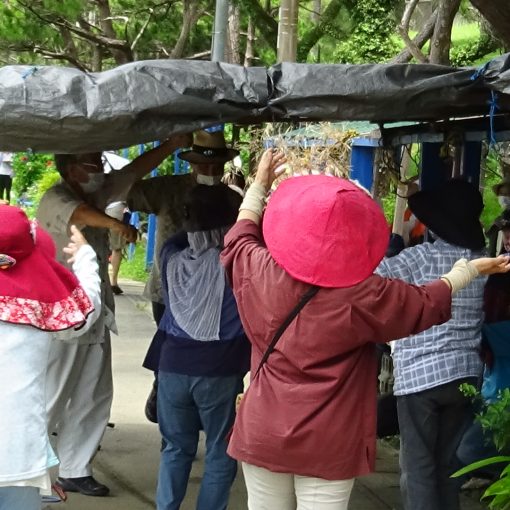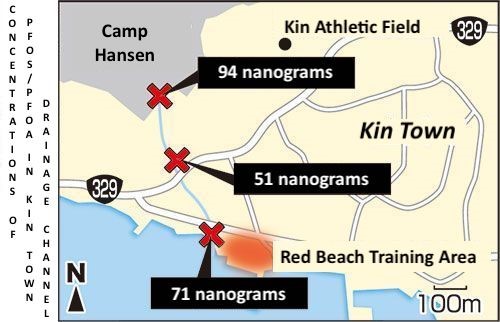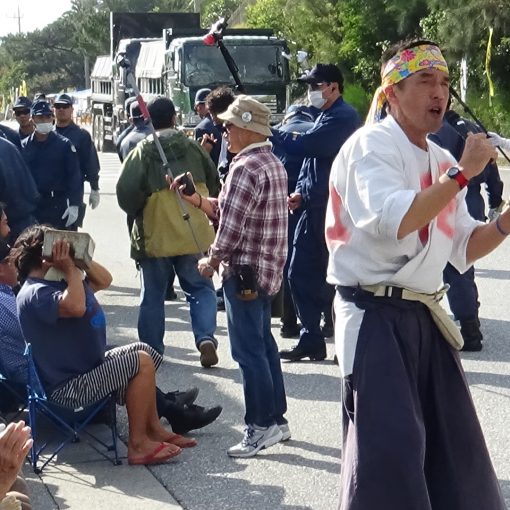July 12, 2020 Ryukyu Shimpo
The number of confirmed coronavirus cases on U.S. military bases in Okinawa rose to 61 from July 7 to 11. July 11 saw 45 cases, nearly three times the number (16) the previous day. The Okinawa Prefectural Government assesses that clusters are occurring at U.S. Marine Corps Air Station Futenma and Camp Hansen.
The problem is that the U.S. military, which is responsible for the matter, has not revealed records of actions by and profiles of those infected or the measures taken with respect to those infected and those with whom they were in close contact. This information is essential in preventing further spread of infection, and is crucial to protect the lives and health of Okinawans.
The Japanese and U.S. governments have executed a memorandum of understanding stipulating that the U.S. military and the Okinawa Prefectural Government exchange information in the case of an outbreak of infectious disease. Nonetheless, if the U.S. military refuses to release even the bare minimum of necessary information, all U.S. bases in Okinawa should be put on lockdown and movement of people associated with the U.S. military should be stopped. That is the only way to protect Okinawans from infection.
In Japan, when a case of coronavirus infection is confirmed, the relevant prefectural government publicly releases, on the day the case is confirmed, the profile of and record of actions by the infected patient as well as the infection route and events leading up to the testing. This is then used for identifying people with whom the patient was in close contact and otherwise carrying out epidemiological surveys in order to take preventative measures.
The U.S. is far ahead of the rest of the world with more than 3 million coronavirus cases, and coronavirus cases among people associated with the U.S. military are increasing everywhere. Nonetheless, in March, the U.S. Department of Defense announced that it would not be publicizing information on the number of coronavirus cases by base and by unit, on the grounds that this information would lead to conjectures on the military’s operational capacity.
The 2013 memorandum of understanding between Japan and the United States stipulates that the U.S. naval hospital and the local public health center notify each other when a case of infectious disease comes to light. According to the Okinawa Prefectural Government, however, it has not been able to obtain all relevant information concerning those infected with coronavirus. The U.S. military’s prioritization of military operations and refusal to appropriately disclose information to the local society shows its lack of regard for Okinawans’ lives and health.
Many people associated with the U.S. military have come to Okinawa for summer relocation. Many of them arrived at Naha Airport on civilian aircraft. The U.S. Marine Corps states that people arriving from overseas are quarantined for 14 days, but there is no way to verify from outside the bases whether this measure is being strictly adhered to.
In fact, large groups were observed in several locations gathering in close proximity and engaging in festivities on the fourth of July, and Japanese locals also participated in these festivities. Locals are also uneasy because the U.S. military has been using off-base civilian hotels as quarantine facilities with no explanation of this policy to the local residents.
The U.S. military claims that it has locked down both of the bases in question, but coronavirus cases are occurring at other bases, such as Kadena, as well. All of the bases should be put on lockdown. The prefectural government should take utmost efforts to discover cases as they arrive by requiring everyone arriving in Okinawa, including those associated with the U.S. military, to undergo PCR tests at the airport.
Since three coronavirus cases were discovered at Kadena Air Base in March, the U.S. military has been unable to stop the spread of infection, and the Japanese government has done nothing but ratify the U.S. military’s approach. The Japanese and U.S. governments are both responsible for the crisis we face now. The Japanese and U.S. governments must immediately disclose information and carry out epidemiological surveys to prevent further infection.
(English translation by T&CT and Sandi Aritza)





